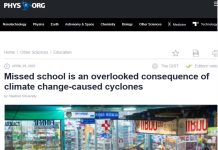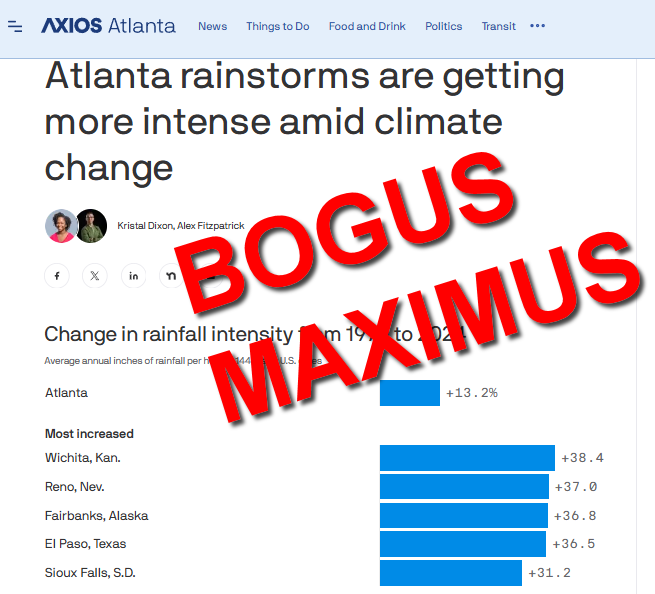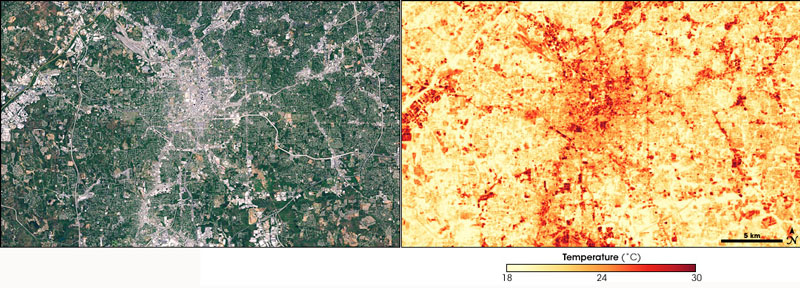In its April 7, 2025 article titled Heavier rain is becoming more common in Atlanta, Axios Atlanta claims that “climate change is causing heavier downpours in Atlanta” citing data supplied by Climate Central (CC). This attribution is false. Evidence shows that localized urban factors—not global CO₂ levels—are responsible for the modest increases in rainfall intensity in cities like Atlanta.
In their Axios article, writers Kristal Dixon and Alex Fitzpatrick parrot flawed conclusions previously debunked in a March 2025 analysis from Climate Realism, titled Climate Central’s Misleading Urban Rainfall Claims Are All Wet. Good reporters would have examined the evidence independently, rather than simply uncritically echoing CC’s claims. As shown in that post, CC failed to examine long-term historical context and rested their claims on cherry-picked data for the trends they identify. When a more comprehensive data set is examined, such as that compiled at Climate at a Glance, national U.S. precipitation patterns do not support the idea of a climate-driven rainfall crisis. The U.S. Precipitation page makes clear: while some regional variability exists, no alarming or unprecedented surge in rainfall frequency or intensity is attributable to climate change.
The most glaring flaw that Axios inherits from CC is the complete omission of the Urban Heat Island (UHI) effect—a basic and long-documented phenomenon in which urban areas retain more heat than surrounding rural regions due to asphalt, concrete, and reduced vegetation. This localized warming creates increased upward convection providing the potential for increased storms in particular locations. Cities like Atlanta are textbook examples of UHI impact as seen in the side-by-side images below.
These paired satellite images, taken in 2000, illustrate the UHI in Atlanta, Georgia. The image on the left is essentially a photo, in which green areas are covered by vegetation, grey areas by built surfaces (pavement and buildings) and brownish areas by bare soil. The image on the right shows land surface temperatures (with a scale). You can see that urban development increases surface temperatures. Source: NASA Earth Observatory
Attributing localized effects to supposed human caused global climate change, while ignoring the critical role urbanization plays seems less of an oversight and more like deliberate misdirection in support of the “climate change causes everything bad” narrative.
Urban areas don’t just heat up differently—they also pollute differently. Cities like Atlanta produce higher levels of particulate matter from vehicles, industrial activity, and heating systems. These particles serve as condensation nuclei, which facilitate cloud formation and rainfall. A 2004 study published in Nature, “Enhanced precipitation due to aerosol effects”, documents this effect, showing how increased aerosols intensify rainfall in heavily polluted areas. These findings have been corroborated in urban studies published by the American Meteorological Society, such as “Urban Influences on Cloud and Precipitation”, which demonstrate how cities create their own microclimates capable of amplifying rainfall—entirely independent of CO₂-driven global climate change.
The rainfall trend that CC and Axios are attributing to “climate change” is more accurately explained by localized human impacts — not emissions from a coal plant in China or a car in Kansas, but heat-retaining surfaces and pollution within the very cities under discussion.
It’s disappointing, but sadly unsurprising, to see Axios uncritically report CC’s dubious climate change attribution for Atlanta’s recent rainfall trends as if it were a proven fact.
Climate Central continues to push a simplistic narrative that ignores fundamental atmospheric physics, misuses regional data, and omits well-established meteorological processes like UHI and aerosol-induced rainfall. Until outlets like Axios start exercising at least a minimal amount of journalistic investigative curiosity, and scrutinize claims made by climate activists that humans are causing changes to the weather, they’re complicit in spreading misinformation, misleading the public concerning the causes and consequences of climate change. This isn’t science, it is narrative engineering in service to a socio-political agenda.




















